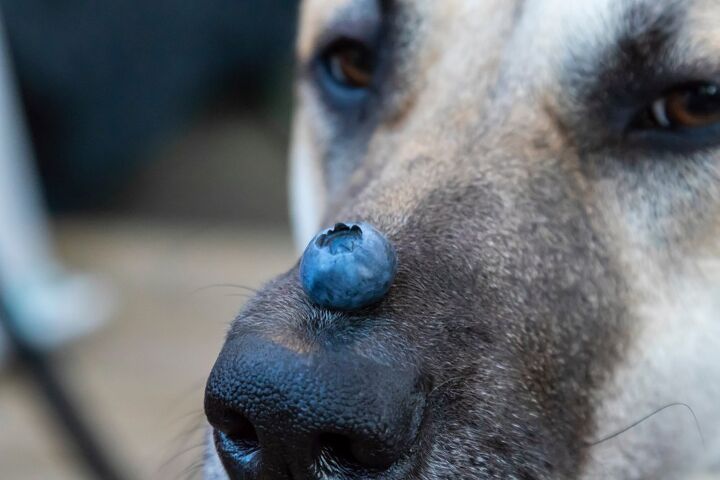Can Dogs Eat Blueberries?

Few things are as delicious as a handful of fresh, ripe blueberries. These tiny little fruits are full of fresh flavor and sweet juice, not to mention all kinds of healthy nutrients. In fact, blueberries are one of the highest natural sources of antioxidants on the planet.
Though blueberries are a tasty treat for humans and an example of a superfood, you may be wondering whether they’re safe for dogs. Keep reading to learn whether dogs can eat blueberries and, if so, how to best include them in your dog’s diet.
Related: Can Dogs Eat Coconut?
The short answer to this question is yes, but there are a few things you should know before you take your dog blueberry picking. First and foremost, know that blueberries are an excellent source of healthy nutrients and can give your dog a boost of nutrition when fed as a snack or included in his daily diet. The berries themselves are small and soft, so they don’t pose a choking hazard, and the seeds are very small as well. The primary risk is feeding a dog blueberries that have been treated with pesticides without washing them properly before feeding.
Blueberries are low in calories, so you don’t have to worry too much about including them in your dog’s diet on a regular basis. In fact, some commercial dog foods use blueberries in their formulas as a natural source of key nutrients. One thing to be mindful of is the fact that blueberries are high in fiber. While fiber is important for healthy digestion, too much fiber could cause digestive upset or diarrhea in dogs. Blueberries also contain a lot of sugar, albeit natural sugar.
Related: Can Dogs Eat Mango?
Just because blueberries are safe for dogs doesn’t mean all blueberry-flavored foods are safe. Snack foods, candy, and other human foods that are blueberry-flavored are still likely to contain added sugar and other things that could harm your dog. The best way to feed your dog blueberries is to feed him fresh or frozen berries that have been washed thoroughly.
If you’re trying to give your dog a boost of healthy nutrients and fiber, feed him a handful of fresh blueberries as a snack or mash them and mix them into his food. You can also freeze blueberries and feed them as a refreshing summer snack. You’ll also find plenty of homemade dog treat recipes online that use blueberries as a main ingredient. Again, just make sure you’re feeding your dog blueberries that haven’t been treated with pesticides or herbicides. Choose organic blueberries to be safe or wash the berries thoroughly before feeding them to your dog.
Before feeding your dog anything new (especially something that is a “human food”), you should consult your veterinarian. This is particularly important if your dog requires a low-fiber diet or is prone to food allergies or sensitivities. Blueberries themselves are very healthy, but every dog’s digestive system is a little bit different so you should be cautious before introducing new foods.

Kate Barrington is the loving owner of two cats (Bagel and Munchkin) and a noisy herd of guinea pigs. Having grown up with golden retrievers, Kate has a great deal of experience with dogs but labels herself a lover of all pets. Having received a Bachelor's degree in English, Kate has combined her love for pets and her passion for writing to create her own freelance writing business, specializing in the pet niche.
More by Kate Barrington






















